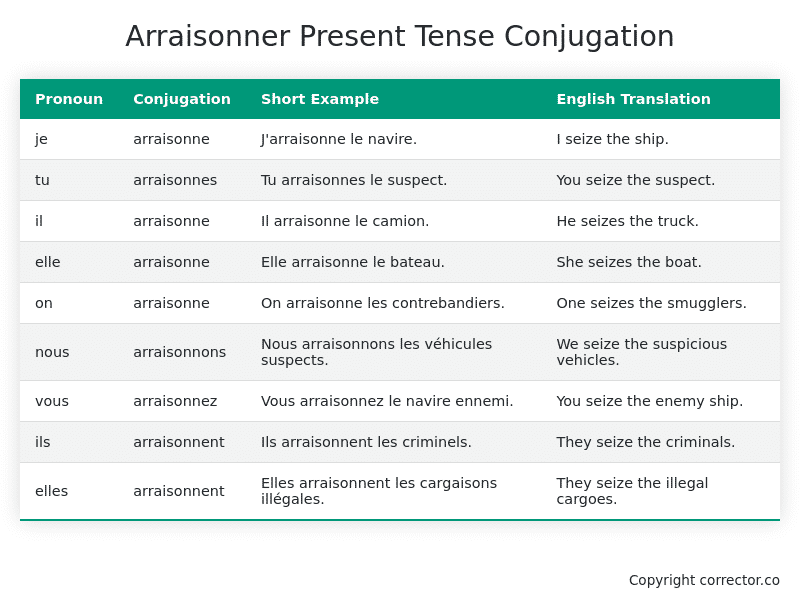Le Present (Present Tense) Conjugation of the French Verb arraisonner
Introduction to the verb arraisonner
The English translation of the French verb “arraisonner” is “to hail” or “to stop and board.” The pronunciation of the infinitive form “arraisonner” is [a.ʁɛ.zɔ.ne].
Arraisonner is derived from the Old French word “raison,” meaning “reason” or “right.” Originally, it referred to the act of stopping a ship at sea to inspect its cargo or to demand payment of duties. In modern everyday French, it is often used in the context of police or legal actions, meaning to stop or intercept someone or to question them.
Examples:
- Les policiers ont arraisonné le véhicule suspect. (The police hailed the suspicious vehicle.)
- La douane peut arraisonner les voyageurs pour vérifier leurs bagages. (Customs can stop and board travelers to check their luggage.)
- Le capitaine a été arraisonné par les autorités portuaires. (The captain was stopped and boarded by port authorities.)
Arraisonner – About the French Present Tense
To take a deep dive into all the French tenses then see our article on Mastering French Tense Conjugation.
Common Everyday Usage Patterns For Le Present
Interactions with Other Tenses
Table of the Present Tense Conjugation of arraisonner
| Pronoun | Conjugation | Short Example | English Translation |
|---|---|---|---|
| je | arraisonne | J’arraisonne le navire. | I seize the ship. |
| tu | arraisonnes | Tu arraisonnes le suspect. | You seize the suspect. |
| il | arraisonne | Il arraisonne le camion. | He seizes the truck. |
| elle | arraisonne | Elle arraisonne le bateau. | She seizes the boat. |
| on | arraisonne | On arraisonne les contrebandiers. | One seizes the smugglers. |
| nous | arraisonnons | Nous arraisonnons les véhicules suspects. | We seize the suspicious vehicles. |
| vous | arraisonnez | Vous arraisonnez le navire ennemi. | You seize the enemy ship. |
| ils | arraisonnent | Ils arraisonnent les criminels. | They seize the criminals. |
| elles | arraisonnent | Elles arraisonnent les cargaisons illégales. | They seize the illegal cargoes. |
Other Conjugations for Arraisonner.
Le Present (Present Tense) Conjugation of the French Verb arraisonner (You’re reading it right now!)
Imparfait (Imperfect) Tense Conjugation of the French Verb arraisonner
Passé Simple (Simple Past) Tense Conjugation of the French Verb arraisonner
Passé Composé (Present Perfect) Tense Conjugation of the French Verb arraisonner
Futur Simple (Simple Future) Tense Conjugation of the French Verb arraisonner
Futur Proche (Near Future) Tense Conjugation of the French Verb arraisonner
Plus-que-parfait (Pluperfect) Tense Conjugation of the French Verb arraisonner
Passé Antérieur (Past Anterior) Tense Conjugation of the French Verb arraisonner
Futur Antérieur (Future Anterior) Tense Conjugation of the French Verb arraisonner
Subjonctif Présent (Subjunctive Present) Tense Conjugation of the French Verb arraisonner
Subjonctif Passé (Subjunctive Past) Tense Conjugation of the French Verb arraisonner
Subjonctif Imparfait (Subjunctive Imperfect) Tense Conjugation of the French Verb arraisonner
Conditionnel Présent (Conditional Present) Tense Conjugation of the French Verb arraisonner
Conditionnel Passé (Conditional Past) Tense Conjugation of the French Verb arraisonner
Conditionnel Passé II (Conditional Past II) Tense Conjugation of the French Verb arraisonner
L’impératif Présent (Imperative Present) Tense Conjugation of the French Verb arraisonner
L’impératif Passé (Imperative Past) Tense Conjugation of the French Verb arraisonner
L’infinitif Présent (Infinitive Present) Tense Conjugation of the French Verb arraisonner
L’infinitif Passé (Infinitive Past) Tense Conjugation of the French Verb arraisonner
Le Participe Présent (Present Participle) Tense Conjugation of the French Verb arraisonner
Le Participe Passé (Past Participle) Tense Conjugation of the French Verb arraisonner
Struggling with French verbs or the language in general? Why not use our free French Grammar Checker – no registration required!
Get a FREE Download Study Sheet of this Conjugation 🔥
Simply right click the image below, click “save image” and get your free reference for the arraisonner present tense conjugation!

I hope you enjoyed this article on the verb arraisonner. Still in a learning mood? Check out another TOTALLY random French verb present conjugation!


